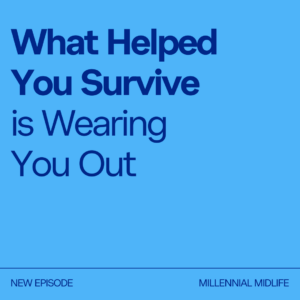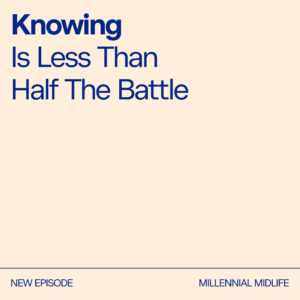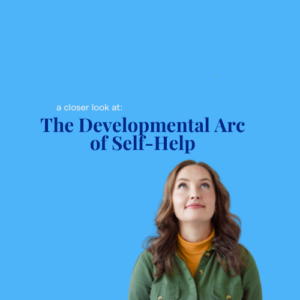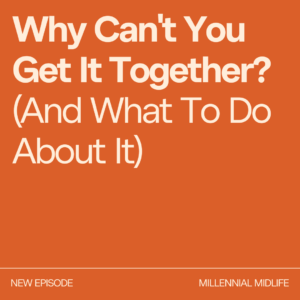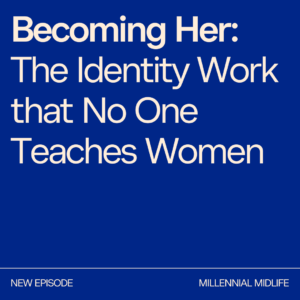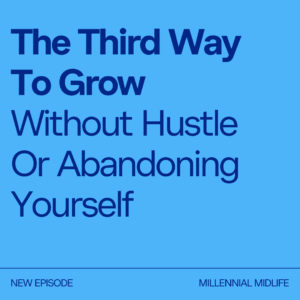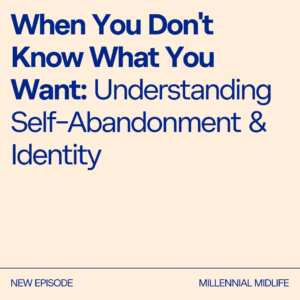Cecelia Baum Mandryk (00:22)
How much willpower do you use to just get through a day? To get yourself out of bed when you’d rather stay under the covers, to push through work that you don’t feel like doing, to keep up with everything on your plate. And how effective is it really? For a while, maybe it worked. Maybe you forced yourself to meet deadlines, you powered through no matter what, you held yourself to probably relatively and possibly high standards. And maybe it’s still working for you, right? Maybe the willpower is still there, but you might be starting to feel the drag of willpower, or you might be starting to feel the energetic usage of willpower throughout your life friction, and you might actually want to stop using it. So whether you’re reaching the point where willpower has already stopped working, I have a lot of people come to me at this point, or you’re using well power but you’ve noticed you’re using it, and you really would like to have a life with a little bit more ease where there’s less forcing that you’re doing to get yourself to kind of follow through, whether you follow either of those categories, that’s what we’re talking about today, and I’ll give you some tips on how to actually change how how you function with and without willpower.
Okay, as I mentioned, a lot of clients come to me kind of at this point. They’ve been using willpower in their lives and all of a sudden, they’re procrastinating more than ever, they’re missing deadlines for the first time in their lives and their question is, what’s wrong with me? Why am I suddenly broken? I wanna blow it all up. I don’t actually want to be doing this and I can’t seem to force myself to do it anymore and so I’m just gonna stop, I’m gonna walk away from it. So they either do that or they want a really quick fix. Help me fix my brain so I can stop procrastinating and get back to exactly how I used to be. But here’s the truth. There’s nothing wrong with them. There’s nothing wrong with you if you’re there. What’s happening is that willpower, which gets us pretty far in life for a lot of us, right? We have a fair amount, is actually a finite resource. And it’s not a reliable resource. And so at some point it runs out or at some point the stick that you’ve been holding over yourself
Cecelia Baum Mandryk (02:21.448)
and it no longer works, right? You can no longer lie to yourself with this willpower force, or you stop believing in yourself. And if you do use a lot of willpower, you might also notice how at some point you, it is taking a lot of energy to use the willpower, right? It’s taking a lot of energy to force yourself to do things. And you just notice maybe how much time within the day you’re trying to force yourself, or how many instances, or maybe things are really starting to feel like a burden that you actually theoretically might enjoy, and you’re trying to figure out what maybe is a softer or more easeful way to go about life. I don’t actually really remember the first time I consciously used willpower to get myself to do something, but it was probably studying for a test that I didn’t really care about, or forcing myself to finish a paper that was in a subject I didn’t really like, or maybe it was around my body and getting my body to be into a shape that I wanted to be, denying things that liked, right, using some part of my brain to force another part of me to do something. And usually it was done with force, and usually it was done with a little bit of meanness. I got very good at this. I got really good at using force to get myself to do things. And a lot of people that I’ve worked with do the same thing, right? They force themselves to meet deadlines. They force themselves to uphold these really high standards. They force themselves to maintain all the different areas of their life very proficiently. I got practiced at the art of I don’t want to, but I’m gonna force myself to do it anyway. Or the more subtle version, I don’t want to because I’m afraid that I’m not gonna be good enough or I’m afraid this isn’t gonna really work out. But now I’m gonna force myself even harder, right? Or I’m really gonna procrastinate to get away from that fear and I’m gonna really have to use willpower to catch up. I’m gonna have to pull an all-nighter or something like.
For so many of us, willpower becomes the only tool in our toolbox. And we start to believe we have to use force to get things done, particularly when we’re in the middle of life and we have a lot of obligations, a lot of things that we’ve kind of taken on either intentionally or have been put on us or we’ve taken on less intentionally. And we feel like we have to actually force ourselves to do that.
Cecelia Baum Mandryk (04:42.99)
Underneath a lot of the force is usually fear, like fear of failing, a fear of being embarrassed or feeling ashamed, fear of being lazy, fear of not being enough, fear that other people are going to reject us or not love us or we won’t be worthy, and why this fear? I mean it makes a lot of sense why we procrastinate, right? Because we’re trying to avoid these feelings. And then it also makes sense why you use willpower to override this because we also don’t want to feel bad feelings, right? We’re afraid of failing, so we procrastinate. And then we’re afraid of not completing it, so we use willpower to work through, right? And so on both sides, there are actually fears. And on both sides, there are these places where we can actually learn a lot about ourselves and get to know ourselves. By the time we get to the middle part of life, life can start to feel like one big grind because there’s so much we have to do and there’s so much that we’ve, so many shoulds that we’ve accumulated and we feel like we just have to kind of get through them. And for so many of us, at some point, it becomes this place where there isn’t enough willpower to power through. There’s not enough force, there’s not enough, there’s not enough force to get ourselves to do the thing that feels scary. And I don’t know if it’s… I’ve seen this a lot with women in their 40s and 50s, and I don’t know if it’s a hormonal shift. don’t know if it’s suddenly we’re coming to a reckoning with ourselves and we’re actually getting in touch with what we really want and we notice what’s important to us versus what’s important to somebody else and where that dissonance is. Or we start to really see the places where we are really afraid and where that fear becomes really big.
When people say, I want to do this, I really do, but I keep putting it off. can’t force myself to do what I used to do. That’s kind of where we are. Right. And this brings to mind something that’s almost, it’s not unrelated. It’s not a conversation that I had earlier today about the role of mindset work in something like losing weight or in a health journey and how a lot of times
Cecelia Baum Mandryk (07:01.874)
we will use willpower to do something like go to the gym or to change how we eat. And we do this because we might have an external goal. We want to look a certain way. We want to feel better in our bodies. We want to age more gracefully or more with more capabilities within our bodies. We might also have a doctor telling us we need to for some reason. And I’ve watched somebody that I know go through this. I didn’t know it from the outside because I’m not very close with them, but I’m kind of social media friends with them, right? So I’ve watched their journey a little bit and they lost a lot of weight and it looked like things were going really well. And then they, whatever happened in life happened and they reverted to who they were, right? They reverted to their old self-concept. And so a lot of times we’re using willpower too to overcome what we perceive as our deficiencies or some way that we believe ourselves to be. And at some point that willpower really can’t overcome that anymore. And so we have to start to look at the story underneath to shift the behavior, to shift how we’re showing up. And when we do that, some really cool things happen. So the real question is in how do I force myself? The better question is, why do I want this? What’s the real reason? If I was choosing this, not forcing it, why would I choose it? Or something more along the lines of, what am I afraid of here? Why am I not engaging with this? This question that we’re actually kind of like afraid to ask, why am I procrastinating? What is the thing, the bad thing that I think is gonna happen if I start this or if I follow through or if I don’t follow through? How do I think I’ll feel if I do it or don’t do it? Because If we’re not using force, we’re using more nuance, right? And maybe force isn’t necessary at all, because what if you could feel good as you do these things? What if you could actually use some of these paths or these tasks or these kind of assignments in life as ways to get to know yourself, not as ways to kind of rule yourself? And this is where working with your brain and nervous system comes in, right? This is the mindset component.
Cecelia Baum Mandryk (09:21.56)
this because it’s about replacing fear and force with connection, with choice, with empowerment. In that place where you normally were kind of a taskmaster with yourself, and force yourself to keep going, replacing that with a connection and getting to know yourself in that moment so you understand the real reasons why you might not want to do something or what you’re afraid of or the more complete story of what’s going on.
If you’ve ever parent a toddler, you know this truth. Yes, you can force them to do something, but it is often with a lot of screaming and some physical kicking, hitting, whatever, right? So that magic can actually happen in really beautiful parenting, because I know you’ve seen this or maybe you’ve even done it, is when you work with them, when you help them come around on their own, when you validate and understand where they’re coming from, where you help them feel heard, where you help them feel seen and then help them move towards doing something of their own volition. And the same is with you. The same is true with you. You don’t actually need to manipulate yourself into compliance. You don’t need to force yourself in that moment. Right? You need to get curious. What am I, why am I trying to force, what am I trying to force myself to do? And why am I needing to use force? Why am I doing this thing? Why do I want to do it? What are, again, all those feelings that are underneath? What am I afraid I’m gonna feel? What are the feelings that are coming up that are preventing me from doing this? What am I trying to create when I procrastinate, right? I’m trying to create a feeling of maybe like a dopamine hit or reward, a little bit of maybe goodness in my life. What am I afraid will happen if I’m on the other side? Will people will reject me or I’ll feel like a failure or I’ll feel ashamed. So here’s the bottom line. Whether you’re using a lot of willpower, whether willpower has stopped working altogether, you’re not a failure, right? You’ve just reached some different place, some different relationship with your brain, and you can actually take it as a really positive thing. Because the people that I’ve worked with, myself included, when the willpower kind of stops working, there’s actually this, again, place, like I said, where you get to connect with yourself, where you get to know yourself even better. It’s an invitation, really. And this invitation is to stop using force and start using self-incor…
Cecelia Baum Mandryk (11:40.458)
to stop fighting against your brain and start working with your brain. And this is a theme right in the show. Stop fighting yourself and start working with yourself. Because yes, willpower can get you through a season. Willpower can kind of do amazing things, but it’s from this place of lack, this place of fear, this place of force, and a different way of getting there. And perhaps A stronger way of getting there is using compassion and curiosity and choice. And those are the things that you can carry with you in the long run. Those are the things that will actually get you further and you’ll feel good taking them, using that route. You’ll have more ease, you’ll have more, the journey will feel less like you’re fighting every step of the way and more like you’re gliding, you’re moving with yourself every step of the way. Okay.
Here’s someone who relies a lot on willpower and you want to start to shift it, start to get curious, right? Recognize when you are using willpower, see if you can pause, see if you can take a different route. And if you do and this resonates, this is home, let me know how you use it, what questions are helpful for you, and I will see you next time.





